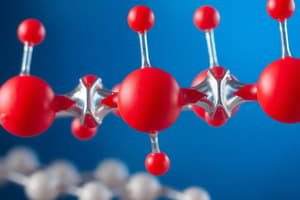Podcast
Questions and Answers
The function of _____ is the breakdown of acetylcholine at the synapse.
The function of _____ is the breakdown of acetylcholine at the synapse.
acetylcholinesterase
What are drugs that prevent degradation of acetylcholine by acetylcholinesterase called?
What are drugs that prevent degradation of acetylcholine by acetylcholinesterase called?
Cholinesterase inhibitors
What is a key feature of cholinesterase inhibitors?
What is a key feature of cholinesterase inhibitors?
Not selective; acts at all cholinergic receptors.
What is the prototype drug for reversible cholinesterase inhibitors?
What is the prototype drug for reversible cholinesterase inhibitors?
What medication class does Neostigmine (Prostigmin) belong to?
What medication class does Neostigmine (Prostigmin) belong to?
What is the mechanism of action for Cholinesterase inhibitors?
What is the mechanism of action for Cholinesterase inhibitors?
What are the pharmacologic effects of Neostigmine?
What are the pharmacologic effects of Neostigmine?
What are the therapeutic effects of cholinesterase inhibitors at therapeutic doses?
What are the therapeutic effects of cholinesterase inhibitors at therapeutic doses?
What are some muscarinic responses expected from cholinesterase inhibitors?
What are some muscarinic responses expected from cholinesterase inhibitors?
What are the neuromuscular effects of Neostigmine?
What are the neuromuscular effects of Neostigmine?
What happens to the CNS effects with increasing concentration of neostigmine?
What happens to the CNS effects with increasing concentration of neostigmine?
What therapeutic use does Neostigmine have for myasthenia gravis?
What therapeutic use does Neostigmine have for myasthenia gravis?
How does Neostigmine reverse nondepolarizing neuromuscular blocking agents?
How does Neostigmine reverse nondepolarizing neuromuscular blocking agents?
What are some adverse effects of Neostigmine related to muscarinic stimulation?
What are some adverse effects of Neostigmine related to muscarinic stimulation?
What can toxic doses of Neostigmine cause regarding neuromuscular blockade?
What can toxic doses of Neostigmine cause regarding neuromuscular blockade?
What are precautions, warnings, and contraindications for Cholinesterase inhibitors?
What are precautions, warnings, and contraindications for Cholinesterase inhibitors?
Flashcards are hidden until you start studying
Study Notes
Cholinesterase Inhibitors Overview
- Function of acetylcholinesterase: Breakdown of acetylcholine at synapses.
- Cholinesterase inhibitors prevent degradation of acetylcholine, acting as indirect-acting agonists by increasing acetylcholine availability.
Key Features of Cholinesterase Inhibitors
- Not selective: Affect all cholinergic receptors (muscarinic and nicotinic).
- Varied duration: Some are reversible while others are irreversible. Irreversible inhibitors bond strongly to enzymes, preventing their activity.
Prototype Drug
- Neostigmine (Prostigmin) is the prototype reversible cholinesterase inhibitor.
Mechanism of Action
- Inhibits acetylcholinesterase, leading to decreased acetylcholine breakdown and increased neurotransmitter availability.
Pharmacologic Effects
- Intensifies ACh transmission at synapses where ACh is the transmitter.
- Effects primarily observed at synaptic junctions and neuromuscular junction, with minimal impact on ganglionic nicotinic receptors or CNS receptors unless high doses are used.
- Muscarinic responses mimic those of direct-acting agonists, leading to effects like increased glandular secretions and GI motility, bradycardia, urinary urgency, and bronchial constriction.
- Neuromuscular effects are dose-dependent; therapeutic doses increase muscle contraction while toxic doses can reduce it due to continuous depolarization.
- Central nervous system effects vary with concentration; therapeutic levels may stimulate while toxic levels may depress CNS activity.
Therapeutic Uses of Neostigmine
- Treatment of Myasthenia Gravis: Increases acetylcholine at nicotinic-M receptors, improving muscle strength and reducing fatigue.
- Reversal of nondepolarizing neuromuscular blockers (e.g., vecuronium) during surgical procedures by increasing synaptic acetylcholine concentration.
Adverse Effects
- Excessive muscarinic stimulation can lead to symptoms like salivation, increased gastric secretions, GI motility, urinary urgency, bradycardia, sweating, pupil constriction (miosis), and accommodation spasm.
- Toxic doses can cause neuromuscular blockade, reducing muscle contraction due to acetylcholine accumulation.
Precautions, Warnings, and Contraindications
- Follow similar guidelines as for direct-acting muscarinic agonists; consult clinical references for specifics.
Studying That Suits You
Use AI to generate personalized quizzes and flashcards to suit your learning preferences.




